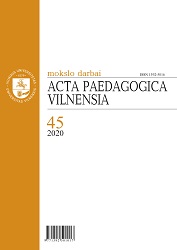Impact of Intercultural Educational Space on the Formation of Intercultural Competence of Future Teachers at a Pedagogical Higher Education Institution
Impact of Intercultural Educational Space on the Formation of Intercultural Competence of Future Teachers at a Pedagogical Higher Education Institution
Author(s): Oksana Pryshlіak, Vira Polishchuk, Natalia LupakSubject(s): Culture and social structure , Higher Education , Sociology of Culture, Sociology of Education
Published by: Vilniaus Universiteto Leidykla
Keywords: intercultural educational space; intercultural competence; Intercultural Maturity Model; future teachers; pedagogical higher education institution;
Summary/Abstract: The proposed research is directed at studying the impact of the intercultural educational space on the formation of intercultural competence of future teachers at a pedagogical higher education institution. To determine the levels of intercultural development, the authors adopted the Intercultural Maturity Model by P. King and M. Baxter Magolda. Having identified the initial, intermediate, and mature levels of intercultural development, the authors analyze the process of completion to the full development of intercultural competence. Experimental research was conducted in 2019 at the Institute of Pedagogics and Psychology at Ternopil Volodymyr Hnatyuk National Pedagogical University, Ukraine. To conduct the study the authors opened the Intercultural Communication Center, whose activity was aimed at modeling and implementation of intercultural educational space at this university. The participants in this study were 63 future teachers (third-year students of the University). The pedagogical experiment included the following stages: preparation, diagnostics, formation, and control. The authors identified the intercultural orientation of the goals of the educational process and tasks at each stage. The following methods were used: analysis, survey, interview, conversation, methods of observation. During the pedagogical experiment, attention was focused on the formation of students’ intercultural abilities according to the content and structure of intercultural competence. The study showed a redistribution of respondents in groups – a significant decrease in the percentage of students on the Initial Development Level (the difference is 55.6%) and an increase on the Intermediate Development Level (the difference is 20.6%) and Mature Development Level (the difference is 34.9%). Statistics allow us to assert the significant dynamics of changes in group indicators by levels of intercultural competence at the beginning and end of the study. The study confirmed the hypothesis that the creation of the intercultural educational space at the higher education institution has a positive effect on the process of intercultural competence formation.
Journal: Acta Paedagogica Vilnensia
- Issue Year: 2020
- Issue No: 45
- Page Range: 42-59
- Page Count: 18
- Language: English

